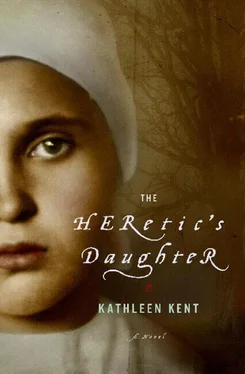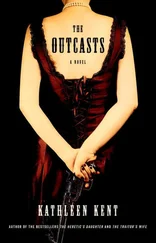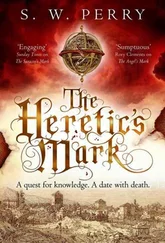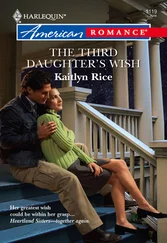The silence of the countryside was absolute and we held our breath whenever passing a darkened house. The rattling of the horse’s trappings was fearfully loud, and Father let the horse go at a slackened pace to ease the quaking of the wagon. Hannah had fallen asleep cradled in my arms, and I prayed she would not waken and cry, as a baby’s mewling can travel a great distance in the night. We did not fear discovery once we had passed over the Shawshin bridge, for although the wagon jostled to wake the dead over the trestle, there were no settlers nearby to question us.
I lay back in the straw and watched the stars in a perfect black bowl, which made the sky look like curdled milk in Mother’s dye pot. The trip would take three hours, enough time for Father to deliver us, then turn straight around to reach Andover before dawn. I fell asleep after a time and dreamt I was floating in a little boat, carried in the strong current of a river, my hand trailing next to the hull. There were dark, dimly formed creatures gliding beneath the surface of the water, the bright sunlight masking what swam below. A creeping numbness started in all my limbs and I could not pull my hand from the water. There soon came the tug of grasping mouths at my fingertips, mouths filled with the buds of tiny sharp teeth. I waited to feel the first stabbing pains drawing blood but woke instead with a start to feel Hannah sucking hungrily upon my fingers.
In the near distance was the dark silhouette of a house, dim yellow light shining from its open doorway. Standing on the threshold was the form of a man, his voice calling out in warning, “Who are you, then?” In his hand was the curved shape of a small scythe. My father’s deep Welsh accent cut through the air like a bass viol. “Thomas Carrier. And I be carrying my two daughters with me, Sarah and Hannah.” At that moment a woman’s shape stood next to the man and she, pulling a cloak about her shoulders, walked out towards the wagon.
“Thomas, what is it? What has happened?” Without seeing her face I knew it was my aunt and could hear the fear in her voice. What else but misfortune would have brought her sister’s husband and two nieces to her doorstep so late of an evening? She drew close to the wagon, but Father said, “Mary, do not yet come so near. I have a letter from your mother. Best you read it first.” His long arm held out the parchment and Mary took it reluctantly, as though it were a serpent that could bite. She walked back to the light of the open door and read the letter, her fingers restless about her neck. She handed it to my uncle and waited for him to finish reading as she strained to see our faces through the darkness. Hannah, satisfied no longer with my fingers, began to cry in earnest. Her crying took on a queer jolting sound as I bounced her harder and harder upon my knees and we waited for a welcome or a turning-away.
Mary walked carefully back to the wagon, carrying a lighted taper, her every step dragging, like one following behind a funeral cart. She stood close by, looking at our white and shuddering forms, pinched from the cold and the late hour. I could see she was afraid, for in taking us into her house, she could well be bringing the means of destruction to her own family. But she held out her arms for Hannah and took her to her breast, covering her with the cloak. Then she said, “You must come in with me now, Sarah.” I climbed stiffly out of the straw, carrying my small bundle, and began to follow her inside. When I saw that Father was not following I stopped, uncertain whether to crawl back into the wagon or enter the strange house.
Father’s voice came to me as deep as vibrating stones. “Be good, Sarah. Keep well.” There was a pause and then a shake of the reins, and without another word he pulled the horse around and rode away. I stood watching him follow his own newly made tracks back towards Andover. The moon had begun to set behind the trees, so the roof of the house could not be seen, only the small rectangle of yellow light in a wall of blackness. I locked tight both knees and planted my feet in the snow, clutching my belongings to my chest. A twig rustled and snapped somewhere in the forest beyond the yard as though something had pawed its way closer to the clearing. And still the door remained open and still I stood outside the house. After a long while, a girl came to stand at the door. She was wearing a white shift and cap, her dark hair spilling over her shoulders. A soft voice called out, “Sarah, come in now. It’s very cold.” But I could not move. The air had turned thick around me and my body had grown rigid and fixed, like a splinter of oak spun in glass. Like a wraith she moved towards me, barefoot in the snow, her hand out, feeling her way in the dark. I saw it was my cousin Margaret, and though she was two years older than I, she was exactly my height. Her hair was crow’s black and she was very slender with a pointed chin that gave her an elfin look. She did not smile or try to speak. She merely reached out for my clenched hands and pulled me gently, until we stumbled together over the threshold.
I stood inside the door, my skirt and shawl steaming in the warmth. Hannah had fallen to sleep in Aunt Mary’s arms, sucking on a rag that had been dipped into a bowl of sugar water. I hoped that they had a cow, for the baby would be wanting milk in the morning. A straw pallet had been set close to the fire, and Margaret led me over to the hearth, which had been newly filled with kindling. I was soon tucked tightly inside thick blankets with Hannah nestled beside me. Sleep came with the sound of my aunt’s voice whispering we would have to sleep and eat apart from the family for some days, until it was certain we did not carry sickness. She did not say what would become of us if we should show signs of the pox.
THE NEXT TWO days Hannah and I lived a half life in the home of Mary and Roger Toothaker. We were given food and a place by the fire but we were kept at arm’s length. I tried to keep Hannah close by, even sharing with her my poppet, but she was restless and willful and would often test her legs in the greater household. In spite of her ban, Aunt would sometimes reach down to pat the top of her head, twining her fingers into the downy ringlets. And then would Hannah bounce about the room happy again. Her antics made Uncle laugh, and he would chuck her lightly under the chin before shooing her back to me.
As the day’s shadows deepened into evening, I sat in my dark corner like an invading spirit and followed their movements about the house. From under my lashes I watched my two cousins, Margaret and her brother, Henry, studying us in turn. Henry was thirteen, slender and dark. To my mind he was furtive and a sneak, and often when Aunt was not looking, he would poke at Hannah or cause her to fall. Once, when he thought we were alone, he crept up behind me and pulled hard at the tender hairs on the back of my neck. My eyes watered but I said nothing and waited. The next morning he found the piss barrel upended over his shoes.
My aunt was also dark, as dark as my mother, but her face likened to my grandmother’s. For where my mother’s eyes showed an unyielding defiance, Mary’s eyes showed, even in the midst of laughter, lines of sadness, giving her a softness and a sweet melancholy. Mother had said she had lost three babes in a row. They could not ripen in her womb and at the turning of the third month were washed away in blood and tears.
Uncle Roger was as unlike my father as any man could be. He was of average height, slender, with somewhat delicate hands for a farmer. He had a high forehead, the dome of which was prominent, for his hair was receding on top. He had more books and pamphlets than I had ever seen in one house. He had an old, well-thumbed Bible, works by Increase and Cotton Mather, almanacs for planting and sowing, and other tracts, printed on the thinnest parchment, telling of news of the colonies. He smiled often, which to me was notable. But the most remarkable thing about him was, where my father was silent, Roger Toothaker was ever talking. He talked from rising in the morning until he retired for bed. He talked through meals and around whatever chores he set his hands to doing through the long winter hours in the house. And it must be said that Uncle never seemed to sharpen an implement or tool a leather harness without handing it over to Henry to finish. It was as though the drudgery of handy-work crossed his ability to weave a story. I remembered watching my father split a cow’s hide and stitch it into the shape of a new plow harness in the time it took my uncle to fasten a buckle onto a brace.
Читать дальше












